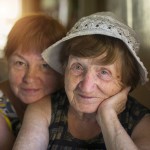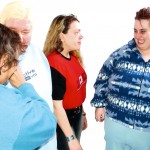
In this blog, Tara Quinn-Cirillo looks at a qualitative study looking at the issue of autonomy for older women with learning disabilities.
[read the full story...]
In this blog, Tara Quinn-Cirillo looks at a qualitative study looking at the issue of autonomy for older women with learning disabilities.
[read the full story...]
Martin Stevens discusses research on gender inequality and intergenerational patterns of care in Europe and reveals possible potential implications for current social care reform.
[read the full story...]
Tom Crossland looks at the findings of a review of the literature regarding women with learning disabilities and forensic needs
[read the full story...]
A recent research project set out to listen to and understand the experiences of women with learning disabilities who were victims of domestic violence. As a result, the project team produced a set of materials to provide information and advice.
Here we look at the video resource produced by the team.
[read the full story...]
This Cochrane review authored by the MSK Elf examines the effectiveness of exercise interventions in preventing bone loss and fractures in postmenopausal women.
[read the full story...]
Listen up systematic reviewers. Don’t make Sarah Knowles angry; you won’t like her when she’s angry. Cue a rather frustrated blog about new research on primary care interventions for intimate partner violence.
[read the full story...]
Eating disorders are chronic conditions associated with high mortality and morbidity as highlighted by a previous Mental Elf blog in 2011. Eating disorders are categorised into three main groups: i. Anorexia Nervosa (AN), ii. Bulimia Nervosa (BN) and iii. Eating Disorder Not Otherwise Specified (EDNOS). Using ICD 10 criteria, EDNOS includes atypical AN and atypical BN as well [read the full story…]

In the mid 1990s, a questionnaire study carried out by Carr and Hollins in Wandsworth suggested that menopause may occur earlier in women with learning disabilities and that for women with Down syndrome, it may occur earlier still. These findings were strengthened by work a couple of years later in a U.S. study by Schupf [read the full story…]

A short while ago, we posted about the development of a tool to help understand the sexual knowledge of people with learning disabilities which was piloted in a secure services setting. There is a growing literature which focuses on issues of abuse, contraception or sex education, but there is little which has looked at how [read the full story…]

We have posted previously about people with learning disabilities in the criminal justice system and the work of the Prison Reform Trust in this area. Colleagues in the Prison Reform Trust are undertaking some research about provision specifically for women with learning disabilities in the criminal justice system. The researcher is carrying out a comparative [read the full story…]